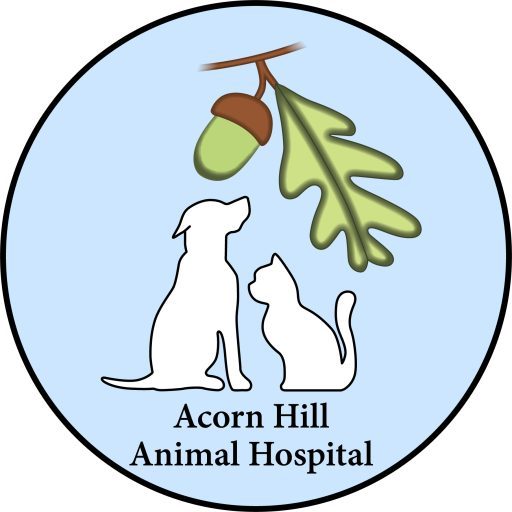Not all pets have the same needs. Here at Acorn Hill Animal Hospital, we will tailor a vaccination protocol to meet your pet’s unique requirements based on lifestyle and stage of life.
Common Vaccines for Dogs and Cats
Common Canine Vaccines include:
- Rabies
- DA2PP or DHLPP – commonly known as “Canine Distemper” (Distemper, Hepatitis, Leptospirosis, Parainfluenza & Parvovirus)
- Bordetella
- Leptospirosis
- Canine Influenza
- Rattlesnake
Common Feline Vaccines include:
- Rabies
- FVRCP – commonly known as “Feline Distemper” (Feline Viral Rhinotracheitis, Calicivirus and Panleukopenia)
- FeLV – Feline Leukemia
Common Testing done Annually
- Heartworm testing (canine)
- Senior Comprehensive Wellness Protocol – Recommended on all pets over the age of 7 (see detailed information below)

Senior Comprehensive Wellness Profiles
What are Comprehensive Wellness Profiles?
Comprehensive Wellness Profiles are blood and urine panels that evaluate many of your pet’s major organ functions. They look at a CBC (complete blood count) which evaluates white blood cells, red blood cells, and platelets to determine if there is any sign of infection, anemia, or some clotting abnormalities. A chemistry panel is assessed to detect early disease conditions involving the liver & gallbladder, kidneys, pancreas, endocrine system (especially the thyroid), mineral & electrolyte abnormalities (affecting most body systems), and checking diabetes status. A Urine specimen is gauged for kidney function, diabetes status, and any signs of urinary infection or stones.
Why is this so important for my pet?
- Early detection can help your pet live a longer, healthier life.
- If the results are normal, then we get to deliver great news that day! The results also serve to establish baseline values we can trend in future years to detect subtle changes or use for comparison should your pet become sick later in the year.
- In the conditions listed above, dogs and cats will not show symptoms (“look like they are sick”) until the condition has progressed and potentially caused permanent damage to the affected organs.
- Cats are notorious for hiding disease until it is truly too late to help them. Unfortunately, when older cats are presented for being ill, their kidney function has diminished to a point that we cannot humanely or economically help them. Most owners are forced to elect humane euthanasia to prevent further suffering.
- Being proactive for your pet’s health can alert us to these conditions earlier in the disease process so that we can start treatment right away to eliminate or reduce further advancement of the disease process. Many times this only involves changing foods and/or adding in appropriate supplements and antioxidants.
- Beginning proactive management of a condition BEFORE your pet shows chronic illness will SAVE you money when compared to the more expensive medications, treatments, and possible hospitalizations required to treat a disease AFTER your pet shows illness.
When should I begin Senior Comprehensive Wellness Profiles?
According to the AVMA (American Veterinary Medical Association) pets are considered “geriatric” around 6-7 years of age and should begin Comprehensive Wellness evaluations.


